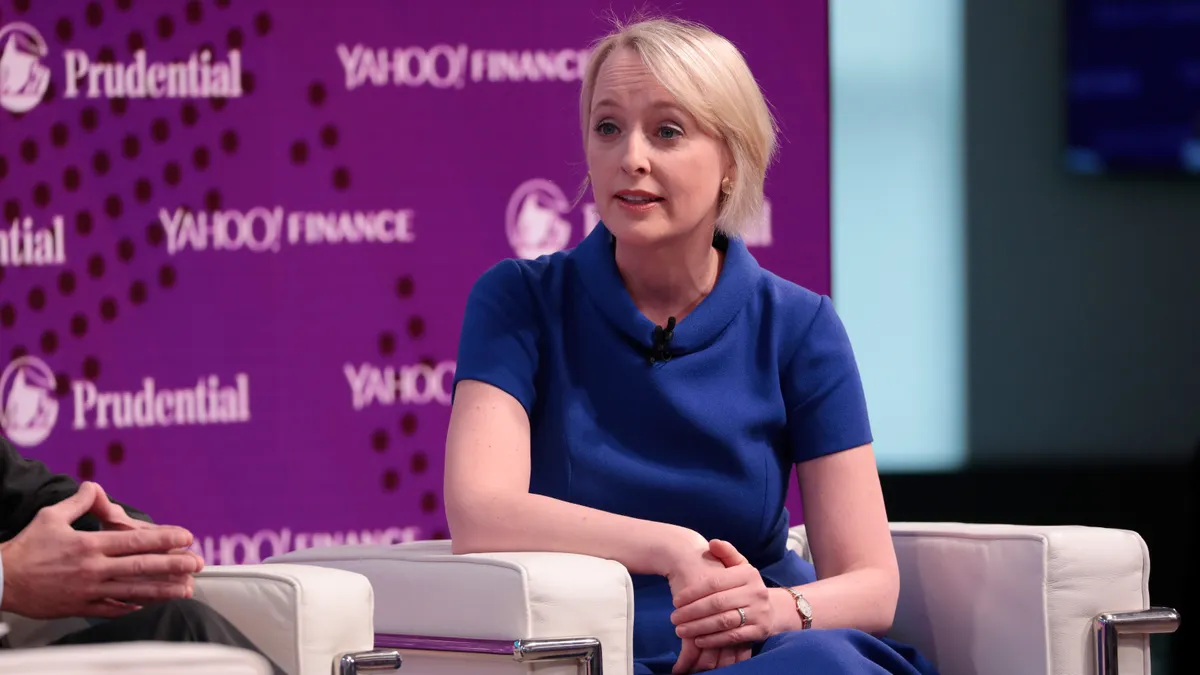Even before the COVID-19 pandemic, Outside GC provided on-demand legal services to a wide array of companies in different regions of the country.
So when the public health crisis hit in 2020, the roughly 100-lawyer outfit didn’t miss a beat and has achieved approximately 40% revenue growth in the time since.
“We were mobilized since we were virtual,” says Outside GC Managing Partner Amy Boatner Jeffrey. “People just had to pick up the phone, and we could keep their operations going.”
Jeffrey, who was named to her new leadership position earlier this month, is confident the firm’s success will continue even as the pandemic gradually subsides and the economy potentially weakens.
She says she is optimistic because Outside GC provides experienced attorneys who support legal departments and other business units at a lower cost than law firm competitors, allowing in-house teams to “add resources while keeping their budgets under control.”
Reduced rate
Jeffrey, who joined Outside GC five years ago, tells Legal Dive the company has a standard rate across geographies that is “well below traditional law firm rates.” A company blog post from April says Outside GC’s lawyers bill at less than one-third of the prevailing hourly rate of large firms in its markets.
A primary reason the legal services provider can provide a reduced rate is its all-virtual nature eliminates many overhead costs, such as brick-and-mortar office space, and those savings are passed on to clients.
Jeffrey, who previously served as deputy general counsel to American Renal Associates, says the firm’s partner-only model also helps it keep its rates lower than law firm competitors.
Because the attorneys Outside GC hires typically have both in-house and Big Law experience, they have the expertise to effectively complete tasks for clients without needing to bring in multiple colleagues to assist. By comparison, partners at traditional law firms often tap teams of associates to help with projects.
“We provide partner-level highly efficient services, whereas in a traditional law firm you have the tiered structure,” Jeffrey says.
However, Jeffrey emphasizes that when clients need subject matter expertise that their Outside GC assigned partner doesn’t possess, other colleagues will step in to provide support.
For example, Jeffrey says her firm has a deep bench of attorneys with expertise in areas such as the life sciences, technology, privacy and cybersecurity.
This full-service team allows Jeffrey to tell clients, “You're getting Amy with 99 other partners behind me.”
Client engagements
There are two primary ways in which companies engage Outside GC, with one being those that do not have in-house counsel and want outside legal support.
These arrangements typically entail the Outside GC lawyer serving as a de-facto general counsel and dedicating a certain number of hours a week to the client.
The Outside GC attorney will not only help with everyday business items such as contracts, but also help the client engage in proactive risk management.
For example, Outside GC provided the technology company Prelert with “technology licensing expertise, as well as strategic advice, in order to quickly turn around end-of-quarter deals,” according to a case study.
Companies who have in-house counsel but don’t want to add more full-time staff to their legal teams also turn to Outside GC for assistance.
This type of arrangement is common when a company experiences a spike in a certain type of work, such as quarter-end sales contracts spikes.
“We're able to step in and handle that spike with them to smooth out the work and then step back as needed,” Jeffrey says.
IGT, a global gaming company formerly known as GTECH, has utilized Outside GC attorneys through the years to handle M&A transactions, commercial agreements and corporate structuring matters, according to a case study.
The only large area of legal service Outside GC does not provide is litigation, and the company says most clients will turn to traditional law firms for that type of work.
Expanding reach and bench
The main geographic areas in which Outside GC attorneys serve clients include Boston, New York, Washington, D.C. and California.
Jeffrey says there are also some locations in other pockets of the country, but she is hopeful the company’s “unprecedented growth” in the last two years will continue and help it expand its reach further.
“I want to grow and spread the Outside GC model across the U.S. and become the provider of choice in this area,” she says.
In tandem with that goal, Jeffrey wants to increase the number of lawyers working for the legal services provider, which has a more than 90% attorney retention rate year over year.
She says a key pitch Outside GC can make to prospective lawyers is that it offers work-life balance, as attorneys can choose the set amount of hours they want to work weekly. Additionally, the lawyers have the opportunity to team with sophisticated clients provided by Outside GC and undertake engaging work.
“I want other attorneys to come work here because this is the way I believe that law should be practiced,” Jeffrey says. “This is just the unicorn of all jobs.”



















